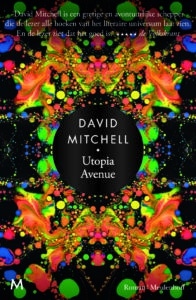Een verhaal over de opkomst en ondergang van een beginnende rockband – een revolutionair nieuw idee is het niet. Maar hoewel Utopia Avenue een ‘gewonere’ roman is dan bijvoorbeeld zijn bestseller Wolkenatlas (2004), wordt in handen van David Mitchell (51) ook een gewoon verhaal nooit alledaags.
Wie eerder iets van de Brit heeft gelezen, zal bijvoorbeeld sommige personages of situaties herkennen uit zijn andere romans. En Mitchells swingende stijl, zijn aanstekelijke vertelplezier en levendige hoofdpersonen voeren je moeiteloos mee naar de Engelse muziekscene van 1967. Twintigers Dean Moss, Elf Holloway, Griff Griffin en de Nederlander Jasper de Zoet bestormen niet alleen het leven, maar ook de hitparades. Al snel maken ze kennis met muzikanten als David Bowie, Janis Joplin, de Stones en de mannen van Pink Floyd, en ze treden op in Rome, Amsterdam en New York. Terwijl de bandleden worstelen met de vraag wie ze zijn en wat ze willen, krijgen ze schandalen te verwerken, en het verlies van dierbaren. Nog maar net wereldwijd doorgebroken wordt de beloftevolle band door een noodlottige gebeurtenis gebroken in de knop.

Voor wie even wil ontsnappen aan corona biedt Utopia Avenue een trip down memory lane naar de tijd van Sgt. Pepper’s Lonely Hearts Club Band van de Beatles. Mitchells liefde voor muziek spat van het papier. Ja, knikt hij, en hij lacht van oor tot oor. ‘I just loooove music.’
Waarom heeft muziek zo’n onweerstaanbare aantrekkingskracht?
‘Dat is precies wat ik wilde onderzoeken met dit boek. Alleen maar door moleculen in de lucht te verplaatsen heeft muziek invloed op ons endocriene systeem. Geluidsgolven kunnen de aanmaak van dopamine of juist adrenaline aanwakkeren, of de haren op je armen rechtovereind zetten. Ik vind het wonderbaarlijk dat slechts vibraties je een transcendente ervaring kunnen geven, er is geen enkele andere vorm van kunst die datzelfde teweegbrengt.’
‘Als je jong bent is die sensatie vaak sterker, maar ook nu nog kan ik helemaal opgenomen worden door een ritme. Mijn relatie met muziek wordt juist rijker naarmate ik ouder word. Ze is als het ware een tijdmachine. Net als het cakeje, de madeleine, in het werk van Marcel Proust kan ook een lied of album je terug katapulteren naar de eerste ochtend waarop je dat nummer hoorde. Dan ben je weer even daar in die ruimte, ruik je de geuren van toen, ervaar je de gevoelens die het hij je opriep. Dat heb je niet als je 22 bent, maar wel op je 51e.’
Voor jongeren is muziek vaak vormend voor hun identiteit. Was dat voor u ook zo?
‘Toen ik een jaar of 16 was, midden jaren tachtig dus, was muziek inderdaad als een menu waar je uit koos: wilde je een scooter boy zijn, of een punker, een hardrocker of een indie? Muziek vormde een leidraad om je af te vragen: wie ben ik?’
En? Wie was u?
‘Ha ha, ik denk dat ik behoorde tot wat je geek rock zou kunnen noemen. Ik hield van bands als Rush, Yes en The Smiths. Andere invloeden waren de newwavebands Joy Division en New Order.’
Toch schreef u niet over de muziek van uw jeugd, maar over de twee jaar voordat u werd geboren. Waarom juist die periode?
‘In die tijd gebeurden veel dingen voor het eerst: een plaat als Sgt. Pepper’s van de Beatles bracht anderhalf jaar lang tal van middelmatige bands tot grotere hoogten. Een album werd niet alleen meer een leuke collectie singles, maar groeide uit tot een kunstvorm op zichzelf, een samenhangend geheel dat een verhaal vertelde, met een veel hoger niveau van songteksten.’
‘Ook ontstond wat we nu wereldmuziek noemen, doordat muzikanten voor het eerst instrumenten uit andere landen hoorden, zoals India. Muziek droeg bij aan de revolutie die in die jaren in de lucht hing. Mensen geloofden dat het mogelijk was om de maatschappij te hervormen. Dat we materialisme van ons af konden schudden en een spiritueler leven konden leiden. Daarom vond ik die tijd interessanter om over te schrijven dan bijvoorbeeld 1987.’
Sommige mensen hebben het gevoel hebben dat we nu in een dystopische tijd leven. Wat kan een verhaal als dit dan betekenen?
‘De ideeën van de jaren zestig waren misschien hopeloos idealistisch, en lang duurde de droom niet. Maar die glimp van een betere wereld voegde wél een nieuwe bestemming toe aan het navigatiesysteem van de samenleving, waardoor het mogelijk was af te stevenen op feminisme en meer diversiteit in gender en seksualiteit. Die eruptie van idealisme is een deel geworden van het weefsel van onze maatschappij. Ik hoop dat mijn roman laat zien dat dromen van een utopia, streven naar een betere wereld, geen verkwisting is van tijd; het geeft richting aan onze samenleving. Maar ik ben geen leraar of filosoof. Ik stel meer vragen dan ik antwoorden geef.’

Is het tegenwoordig moeilijker om te ontdekken wie je bent dan toen?
‘Het verschil is denk ik dat we onszelf tegenwoordig niet meer zien als een enkelvoudige entiteit, maar als een individu met vele ‘ik-jes’, en dat beeld wordt versterkt door de sociale media. Misschien is de waarde van literatuur, muziek en andere vormen van kunst wel dat zij ons kan helpen een goed functionerend parlement op te bouwen uit al die stemmen waaruit we als mens bestaan. Onze samenleving is zo confronterend geworden, zo gepolariseerd. Luisteren naar andermans mening staat voor velen gelijk aan zich overgeven, aan verlies. Maar literatuur drukt even op de pauzeknop; je houdt letterlijk even je mond dicht en luistert naar andere stemmen en standpunten, waardoor je misschien net iets anders over een bepaald onderwerp gaat denken. En dat is allesbehalve verlies.’
Ook uw oeuvre bestaat uit vele ‘ik-jes’; uw romans zijn allemaal door middel van personages, situaties of andere parallellen met elkaar verbonden.
‘Dat klopt, ik bouw aan wat ik een “überroman” noem; een web van boeken die met elkaar in verbinding staan. Mij als schrijver schenkt de vertrouwdheid van personages een grote mate van voldoening, het is alsof ik een oude vriend terugzie. Het bouwen aan een überroman stelt me in staat om tegelijkertijd een minimalist en een maximalist te zijn. Ik kan een roman schrijven over een bepaald milieu, een bepaalde tijd en plaats, terwijl dat tegelijkertijd deel uitmaakt van een groter geheel, die veel meer diepte heeft.’
‘Wie De niet verhoorde gebeden van Jacob de Zoet heeft gelezen, heeft Jaspers voorvader ontmoet. Dan weet je ook dat Jaspers psychose geen psychose is, maar werkelijkheid; door zijn bloedlijn stroomt een oude vloek. Maar voor wie die roman niet heeft gelezen, zijn beide interpretaties even plausibel. Een roman moet als een kathedraal zo groot zijn, zodat er meerdere, paradoxale waarheden naast elkaar kunnen bestaan.’
‘Misschien is dat wel de reden dat onze huidige tijd dystopisch aanvoelt: er is nauwwelijks nog ruimte voor paradoxale waarheden. Door de macht van de algoritmen komen we vooral nog in aanraking met gelijkgestemden, en nog maar weinig met andersdenkenden. Groepen met een bepaalde mening vormen grote, afgesloten gemeenschappen met maar één waarheid.’
Toch hecht u, ondanks deze ‘überroman’, zelf het meeste waarde aan uw vertalingen van twee boeken van een Japanse jongen over zijn autisme.
‘De wereld heeft geen gebrek aan romans, zelfs niet aan goede romans. Maar er is wel een gebrek aan kennis en begrip van autisme. Ik was heel blij om de co-vertaler van mijn Japanse vrouw te zijn in deze. Twee, drie jaar geleden was ik op een medisch congres in Engeland, en vertelde een dokter me dat ze die boeken meegeeft aan ouders van kinderen met autisme, zodat ze niet het gevoel hebben dat ze hun dochter of zoon verloren hebben, maar hun kind kunnen leren begrijpen.’
‘Ook al heb ik een zoon met autisme, ik zou er nooit zo authentiek over kunnen schrijven als iemand die het zelf heeft. Maar ik kan er wel over schrijven vanuit meerdere perspectieven, op een kubistische manier. En dat ben ik wel van plan nog eens te doen in een van mijn toekomstige romans.’
